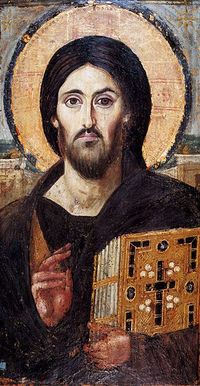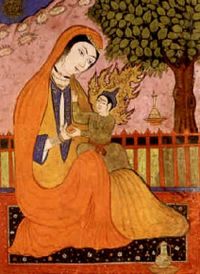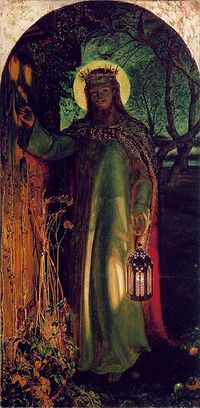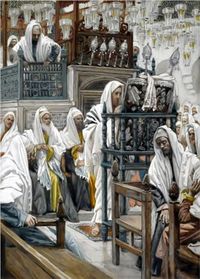Difference between revisions of "Historical Jesus, in Christianity, Judaism and Islam (2015 Boccaccini), course"
| (18 intermediate revisions by the same user not shown) | |||
| Line 20: | Line 20: | ||
The course focuses on the founder of Christianity, [[Jesus of Nazareth]] (Jesus son of Joseph, Joshua bar-Yosef, Isa), as an historical character. By examining all extant historical sources (Jewish, Christian, and Islamic), the course offers a critical reconstruction of the major stages of the life and deeds of the prophet from Nazareth, from his birth under Herod the Great to his death and crucifixion under Pontius Pilate, within the diverse world of Second Temple Judaism. The format of the course consists of three lectures per week by the instructor and a weekly discussion session conducted by a GSI. The course grade will be based upon daily assignments and attendance; two midterms, a paper and a final exam. | The course focuses on the founder of Christianity, [[Jesus of Nazareth]] (Jesus son of Joseph, Joshua bar-Yosef, Isa), as an historical character. By examining all extant historical sources (Jewish, Christian, and Islamic), the course offers a critical reconstruction of the major stages of the life and deeds of the prophet from Nazareth, from his birth under Herod the Great to his death and crucifixion under Pontius Pilate, within the diverse world of Second Temple Judaism. The format of the course consists of three lectures per week by the instructor and a weekly discussion session conducted by a GSI. The course grade will be based upon daily assignments and attendance; two midterms, a paper and a final exam. | ||
Lectures: MWF 3-4pm | Lectures: MWF 3-4pm (1427 Mason Hall) | ||
Office: 4145 Thayer, Department of Near Eastern Studies | Office: 4145 Thayer, Department of Near Eastern Studies | ||
| Line 44: | Line 44: | ||
* See [[Gospel of Mark]] -- [[Q Gospel]] -- [[Gospel of Matthew]] -- [[Gospel of Luke]] -- | * See [[Gospel of Mark]] -- [[Q Gospel]] -- [[Gospel of Matthew]] -- [[Gospel of Luke]] -- | ||
(3) Mon Sep 14, 2015 -- Jesus in Christianity (II): The | (3) Mon Sep 14, 2015 -- Jesus in Christianity (II): The tradition of John | ||
* See | * See [[Gospel of John]] | ||
(4) Wed Sep 16, 2015 -- Jesus in Christianity (III): the "apocryphal" Gospels | (4) Wed Sep 16, 2015 -- Jesus in Christianity (III): the "apocryphal" Gospels | ||
* See [[Gospels]] | * See [[Gospel of Thomas]] -- [[Gospels]] | ||
(5) Fri Sep 18, 2015 -- Jesus in Judaism (I): Flavius Josephus | (5) Fri Sep 18, 2015 -- Jesus in Judaism (I): Flavius Josephus | ||
| Line 58: | Line 58: | ||
(7) Wed Sep 23, 2015 -- Jesus in Islam (I): the Qur'an | (7) Wed Sep 23, 2015 -- Jesus in Islam (I): the Qur'an | ||
* See [[Jesus in Islam]] | * See [[Jesus in Islam]] | ||
* See [ | * See [https://www.youtube.com/watch?v=Zy_eeEYucCw (National Geographical Documentary)] | ||
(8) Fri Sep 25, 2015 -- Jesus in Islam (I): An Islamic Gospel? The [[Gospel of Barnabas]] | (8) Fri Sep 25, 2015 -- Jesus in Islam (I): An Islamic Gospel? The [[Gospel of Barnabas]] | ||
| Line 189: | Line 189: | ||
* See [[Nativity of Jesus]] | * See [[Nativity of Jesus]] | ||
(2) Mon Nov 23, 2015 -- | (2) Mon Nov 23, 2015 -- A Modern Gospel of the 1960s and 1970s | ||
* [[Godspell (1973 Greene), feature film]] | |||
* See [http://www.youtube.com/watch?v=tlKX-m17C7U John Lennon's Give Peace a Chance] | |||
* See [https://vimeo.com/76924173 Jesus Movement] | |||
(-) [ Wed Nov 25, and Fri Nov 27, 2015 -- Thanksgiving Recess, no classes ] | |||
(3) Mon Nov 30, 2015 -- A Modern African Gospel | |||
* [[The Son of Man (2005 Dornford-May), feature film]] | |||
(4) Wed Dec 2, 2015 -- Fantastic Archaeology (arch-fi) and Modern Legend about Jesus : | |||
* See [[Fantastic Archaeology]] | |||
(a) Did Jesus ever existed? | |||
* See [[Jesus Myth Theory]] | * See [[Jesus Myth Theory]] | ||
* See [[Dionysius]], [[Horus]], [[Hercules]], [[Orpheus]] | * See [[Dionysius]], [[Horus]], [[Hercules]], [[Orpheus]] | ||
| Line 196: | Line 212: | ||
* See [[Zeitgeist: The Movie (2008 Joseph), documentary]] | * See [[Zeitgeist: The Movie (2008 Joseph), documentary]] | ||
( | (a) Was Jesus a Member of a Secret Organization? Did Jesus visit India? Did He Survive the Crucifixion? | ||
* See [[Jesus Hidden Years]] | |||
* See [[Jesus Survival]] | |||
* See [[Jesus in India]] | |||
( | (b) Was Jesus Married? Did He Have Children? | ||
* See [[The Da Vinci Code]] | * See [[The Da Vinci Code]] | ||
* See [[Mary Magdalene]] | * See [[Mary Magdalene]] | ||
* See [[Holy Grail]] -- [[Married Jesus]] -- [[Jesus Bloodline]] | * See [[Holy Grail]] -- [[Married Jesus]] -- [[Jesus Bloodline]] | ||
====Part IV - JESUS FESTIVAL==== | ====Part IV - JESUS FESTIVAL==== | ||
| Line 212: | Line 226: | ||
(1) Fri Dec 4, 2015 -- Students' reports (I) -- Contemporary scholarly portraits | (1) Fri Dec 4, 2015 -- Students' reports (I) -- Contemporary scholarly portraits | ||
(2) Mon Dec 7, 2015 -- Students' reports ( | (2) Mon Dec 7, 2015 -- Students' reports (II) -- Contemporary scholarly portraits | ||
(3) Wed Dec 9, 2015 -- Students' reports ( | (3) Wed Dec 9, 2015 -- Students' reports (III) -- Contemporary scholarly portraits | ||
(4) Fri Dec 11, 2015 -- Students' reports ( | (4) Fri Dec 11, 2015 -- Students' reports (IV) -- Contemporary fictional portraits (movies) | ||
(5) Mon Dec 14, 2015 -- Wrap-Up Session—-Who Was Jesus? | (5) Mon Dec 14, 2015 -- Wrap-Up Session—-Who Was Jesus? | ||
| Line 223: | Line 237: | ||
Final Exam [TBA] | Final Exam [TBA] | ||
* See [http://www.ro.umich.edu/exams/fall14.php Fall 2014 Final Examination Schedule] | * See [http://www.ro.umich.edu/exams/fall14.php Fall 2014 Final Examination Schedule] | ||
==Students' Bibliography== | |||
====Jesus in Islam==== | |||
See [[Muslim Jesus]] | |||
* [[Islam's Jesus (2014 Saritoprak), book]] | |||
* [[Zealot: The Life and Times of Jesus of Nazareth (2013 Aslan), book]] | |||
* [[Christians, Muslims, and Jesus (2013 Siddiqui), non-fiction]] | |||
* [[Images of Jesus Christ in Islam (1999 Leirvik), book]] (2nd revised ed. 2010) | |||
* [[The Muslim Jesus: Sayings and Stories in Islamic Literature (2001 Khalidi), book]] | |||
* [[Jesus in the Quran (1965 Parrinder), book]] | |||
* [[The Gospel of Barnabas (1984 Sox), book]] | |||
==== Roman Catholic / Protestant views on Jesus ==== | |||
* [[Jesus and the Powers: Conflict, Covenant, and the Hope of the Poor (2011 Horsley), book]] | |||
* [[Christianity in the Making: 1. Jesus Remembered (2003 Dunn), book]] | |||
* [[What Are They Saying about the Historical Jesus? (2007 Gowler), book]] | |||
* [[Jesus: Apocalyptic Prophet of the New Millennium (1999 Ehrman), book]] | |||
* [[Jesus: A Revolutionary Biography (1994 Crossan), book]] | |||
* [[The Five Gospels: The Search for the Authentic Words of Jesus (1993 Funk/Hoover), book]] | |||
* [[The Historical Figure of Jesus (1993 Sanders), book]] | |||
* [[Jesus within Judaism (1988 Charlesworth), book]] | |||
==== Eastern Orthodox Christian Perspectives on Jesus ==== | |||
*[[Bauckman, Richard. Jesus and the Eyewitnesses: The Gospels as Eyewitness Testimony. 2008. | |||
*[[Bauckman, Richard. Jesus and the God of Israel. 2008. | |||
*[[Barrois, Georges. Jesus Christ and the Temple. 1980. | |||
*[[Meyendroff, John. Christ in Eastern Christian Thought. 2011. | |||
*[[Bauckman, Richard. Jesus: A Very Short Introduction. 2011. | |||
*[[Bauckman, Richard. Jude and the Relatives of Jesus in the Early Church. 2004. | |||
*[[Jesus through the Centuries: His Place in the History of Culture (1985 Pelikan), book]] | |||
==== Jesus in Judaism ==== | |||
See [[Jewish views of Jesus]] | |||
* [[The Jewish Gospels: The Story of the Jewish Christ (2012 Boyarin), book]] | |||
* [[Jesus in the Talmud (2007 Schäfer), book]] | |||
* [[The Misunderstood Jew: The Church and the Scandal of the Jewish Jesus (2006 Levine), book]] | |||
* [[Jesus in His Jewish Context (2003 Vermès), book]] | |||
* [[Brother Jesus: The Nazarene through Jewish Eyes (2001 Ben-Chorin), book (English ed.)]] | |||
* [[Jesus the Jew (1973 Vermès), book]] | |||
* [[Jesus and Israel (1971 Isaac), book (English ed.)]] | |||
* [[Jesus (1969 Flusser), book (English ed.)]] | |||
====Jesus in Literature==== | |||
* [[The Good Man Jesus and the Scoundrel Christ (2010 Pullman), novel]] | |||
* [[The Gospel According to the Son (1997 Mailer), novel]] | |||
* [[The Gospel According to Jesus Christ (1994 Saramago / Pontiero), novel (English ed.)]] | |||
* [[Live from Golgotha (1992 Vidal), novel]] | |||
* [[The Last Temptation (Ο τελευταίος πειρασμός / 1960 @1951 Kazantzakis / Bien), novel (English ed.)]] | |||
* [[King Jesus (1946 Graves), novel]] | |||
* [[The Nazarene (1939 Asch / Samuel), novel]] | |||
====Jesus in Music==== | |||
See [[:Category:Jesus of Nazareth--music (subject)]] | |||
* [[Jesus Christ Superstar (1971 Webber), opera]] | |||
* [[Godspell (1971 Schwartz), musical]] | |||
* [[Christus (1866 Liszt), oratorio]] | |||
* [[The Messiah (1742 Haendel / Jennens), oratorio]] (http://opera.stanford.edu/iu/libretti/messiah.htm) | |||
* [[Matthäuspassion (1727 Bach), oratorio]] (http://www.gbt.org/music/St_Matthew_text.pdf) | |||
* [[Johannespassion (1724 Bach), oratorio]] (http://emmanuelmusic.org/notes_translations/translations_cantata/t_bwv245.htm) | |||
==Grading System and Requirements (for students attending the course)== | ==Grading System and Requirements (for students attending the course)== | ||
| Line 228: | Line 311: | ||
[Read this section of the syllabus very carefully. The syllabus is like a contract between the student and the instructors, which we are all bound to respect.] | [Read this section of the syllabus very carefully. The syllabus is like a contract between the student and the instructors, which we are all bound to respect.] | ||
ATTENDANCE: The course is based on lectures, weekly discussion session, three written exams, and one paper. Regular attendance is mandatory. If you happen to miss a session, it is your responsibility to ask the Professor or the GSI or a class-mate for information about what was discussed in class. Students whose attendance is poor (that is, have missed | ATTENDANCE: The course is based on lectures, weekly discussion session, three written exams, and one paper and final oral presentation. Regular attendance is mandatory. If you happen to miss a session, it is your responsibility to ask the Professor or the GSI or a class-mate for information about what was discussed in class. Students whose attendance is poor (that is, have missed more than 1/3 of total classes, either lectures or discussion sessions, without justification) will see their final grade reduced up to six percentage points. Students who do not attend the class regularly (that is, have missed more than 50% of classes, either lectures or discussion sessions, without justification), or do not fulfill each and all the requirements of the course, will not be graded and will receive a NR report | ||
GRADING SYSTEM: The final grade is based on five elements (of which the last one is optional): | GRADING SYSTEM: The final grade is based on five elements (of which the last one is optional): | ||
(a) Participation: 10% -- (b) First Midterm: 10% -- (c) Second Midterm: 20% -- (d) Paper 20% – (e) Final exam: | (a) Participation: 10% -- (b) First Midterm: 10% -- (c) Second Midterm: 20% -- (d) Paper 20% – (e) Oral presentation: 10% -- (f) Final exam: 30% -- (g) Re-taking of the first & second Exam (optional): possible increase | ||
(a) Quality of participation in class and discussion sessions makes 10% of the final grade. The evaluation will be made conjunctly by the Professor and the GSIs on the basis of the student’s attention, comments, questions, commitment for an enjoyable environment, etc., as follows: Outstanding (100%) / Excellent (95%) / Very good (90%) / Good (85%) / Average (80%) / Poor (75%) / Very poor (70%) / Insufficient (65% or less) | (a) Quality of participation in class and discussion sessions makes 10% of the final grade. The evaluation will be made conjunctly by the Professor and the GSIs on the basis of the student’s attention, comments, questions, commitment for an enjoyable environment, etc., as follows: Outstanding (100%) / Excellent (95%) / Very good (90%) / Good (85%) / Average (80%) / Poor (75%) / Very poor (70%) / Insufficient (65% or less) | ||
| Line 243: | Line 326: | ||
* F (66% or less) | * F (66% or less) | ||
The first midterm exams (10% of the final grade) is a series of 50 questions about the contents of the | The first midterm exams (10% of the final grade) is a series of 50 questions about the contents of the Introduction to the course. It is aimed to be a sort of preparation to the more important second mid-term and final exams. If your grade is F, you must submit a written petition (by e-mail) to the Professor and receive written permission (by e-mail) to continue the class, provided that your attendance is good. If you need or want to improve your grade, you may retake your exam, following the instructions below (g). | ||
The second midterm exam (20% of the final grade) is a series of 100 questions (80 new questions about the contents of the second part of the course, plus 20 questions from the first midterm). If your grade is F, you must submit a written petition (by e-mail) to your GSI and receive written permission (by e-mail) to continue the class, provided that your attendance is good. If you need or want to improve your grade, just followed the instructions below ( | The second midterm exam (20% of the final grade) is a series of 100 questions (80 new questions about the contents of the second part of the course, plus 20 questions from the first midterm). If your grade is F, you must submit a written petition (by e-mail) to your GSI and receive written permission (by e-mail) to continue the class, provided that your attendance is good. If you need or want to improve your grade, just followed the instructions below (g). | ||
(d) As a written assignment (20% of your final grade), you have to pick up an episode or a character of the Gospel (your choice must be pre-approved by your GSI) and write (by Dec | (d) As a written assignment (20% of your final grade), you have to pick up an episode or a character of the Gospel (your choice must be pre-approved by your GSI) and write (by Dec 2, 2015) a (2,000/2,500 word) paper dealing with the interpretation of Jesus by a (Christian, Jewish, Muslim, or secular) author. (The bibliography must include the reading of at least one books, or an equivalent number of articles). | ||
*A+ = 99% / A = 95% / A- = 90% | *A+ = 99% / A = 95% / A- = 90% | ||
| Line 256: | Line 339: | ||
The best papers may be used and posted online in “4 Enoch: The Online Encyclopedia of Second Temple Judaism” <www.4enoch.org> under your name. | The best papers may be used and posted online in “4 Enoch: The Online Encyclopedia of Second Temple Judaism” <www.4enoch.org> under your name. | ||
(e) The final exam ( | (e) For the oral presentation the students are divided in 8 groups; each group will make a (visual & oral) collective presentation of 25m inspired to the contents of their papers. | ||
(f) The final exam (30% of the final grade) is a series of 150 multiple-choice questions aimed at a general review of the entire course: 100 new questions about the contents of all three parts of the course (but with special emphasis on the third and last part), plus 50 questions from the first two exams (15+35, respectively). The grading system will follow the same criteria as the midterm exams. No retake is allowed for the final exam. | |||
( | (g) [Optional] The Instructor’s goal is to help the deserving students, who may have some initial difficulties, to improve their grade. If your grade is less than B+ (85% or less), you may choose to retake your first and/or second exam. The questions will be the same, except for 5 new questions (in the first exam) or 10 new questions (in the second exam). Depending on your new grade, you will have an increase up to 9 points (if you get an A+), 7 points (A), 5 points (A-) or 3 points (B+) points (0 if you get B or less) on the grade of your exam. In no case your final percentage can overcame 86%. No retake is allowed for the final exam. | ||
Latest revision as of 12:09, 2 December 2015





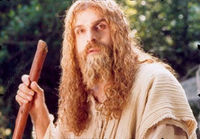

Historical Jesus, in Christianity, Judaism and Islam is a course offered by Gabriele Boccaccini at the University of Michigan in the Fall 2015.
Overview
The course focuses on the founder of Christianity, Jesus of Nazareth (Jesus son of Joseph, Joshua bar-Yosef, Isa), as an historical character. By examining all extant historical sources (Jewish, Christian, and Islamic), the course offers a critical reconstruction of the major stages of the life and deeds of the prophet from Nazareth, from his birth under Herod the Great to his death and crucifixion under Pontius Pilate, within the diverse world of Second Temple Judaism. The format of the course consists of three lectures per week by the instructor and a weekly discussion session conducted by a GSI. The course grade will be based upon daily assignments and attendance; two midterms, a paper and a final exam.
Lectures: MWF 3-4pm (1427 Mason Hall)
Office: 4145 Thayer, Department of Near Eastern Studies
e-mail: gbocca@umich.edu; tel 763.1595; fax 936.2679
Office Hours: WF 4-4:30pm (classroom); 4:30-5:30 (office), or by appointment
History
Gabriele Boccaccini is Professor of Second Temple Judaism and Christian Origins at the University of Michigan since the Fall 1992. He has been offering courses on Jesus & the Gospels since the mid-1990s.
Syllabus (Fall 2015)
[Note: The syllabus may be subjected to some minor changes]
Introduction: Christians, Jews, & Muslim views of Jesus
(1) Wed Sep 9, 2015 -- Do we have any evidence from Jesus himself?
- See Relics of Jesus
(2) Fri Sep 11, 2015 -- Jesus in Christianity (I): the synoptic tradition
- See Gospel of Mark -- Q Gospel -- Gospel of Matthew -- Gospel of Luke --
(3) Mon Sep 14, 2015 -- Jesus in Christianity (II): The tradition of John
- See Gospel of John
(4) Wed Sep 16, 2015 -- Jesus in Christianity (III): the "apocryphal" Gospels
- See Gospel of Thomas -- Gospels
(5) Fri Sep 18, 2015 -- Jesus in Judaism (I): Flavius Josephus
(6) Mon Sep 21, 2015 -- Jesus in Judaism and other non-Christian authors (II): the Toledot Jeshu a
- See Jesus in Judaism
(7) Wed Sep 23, 2015 -- Jesus in Islam (I): the Qur'an
(8) Fri Sep 25, 2015 -- Jesus in Islam (I): An Islamic Gospel? The Gospel of Barnabas
(9) Mon Sep 28, 2015 -- The "Historical" Jesus
(10) Wed Sep 30, 2015 -- The Historical Context--Jews and Romans
[First Mid-term – During discussion sessions in the following week, Oct 5-9, 2015]
PART I – The Ministry of Jesus
(1) Fri Oct 2, 2015 -- The Precursor, John the Baptist: His Life and Death.
- See John the Baptist and John the Baptist (sources)
- See Preaching of John the Baptist
- See: Beheading of John the Baptist, and Salome
(2) Mon Oct 5, 2015 -- John the Baptist and Jesus. Did John Recognize Jesus as the Messiah?
(3) Wed Oct 7, 2015 -- The Beginnings of Jesus’ Ministry as a Miracle-Worker
(4) Fri Oct 9, 2015 -- From Healer to Forgiver
- See Paralytic at Capernaum
- See Recruiting the Tax Collector
- See Jesus and the Adulteress
- See Lost Sheep
(5) Mon Oct 12, 2015 -- The Announcer of the Kingdom of God / The Parables of the Kingdom
- See Prodigal Son
- See Workers in the Vineyard
(6) Wed Oct 14, 2015 -- Where does the authority of Jesus come from? / The Heavenly Messiah
- See Question about Authority
- See Jesus and Beelzebul
- See Peter's Confession
- See Transfiguration of Jesus
(7) Fri Oct 16, 2015 -- The Disciples and the Family
- See Hometown Rejection
- See Jesus' True Relatives
- See Would-be Followers of Jesus
- See Choosing of the Twelve
(-) [ Mon Oct 19, 2015 ] Fall Study Break, no class
(8) Wed Oct 21, 2015 -- Agreements and Controversies with the Pharisees
- See Great Commandment
- See Tradition of the Elders
- See Pharisee and the Publican
- See Question about the Son of David
- See also Pharisees and Pharisees (sources)
(9) Fri Oct 23, 2015 -- Relation with the non-Jews (Gentiles)
- See Gerasene Demoniac
- See Canaanite Woman
- See Centurion's Servant
(10) Mon Oct 26, 2015 -- Teaching of Jesus (I): Forgiveness. Good Works, Moral Integrity
- See Talents
- See Judgment of the Son of Man
- See Unforgiving Servant
- See Sermon on the Mount
- See Little Children Blessed
- See Temptations to Sin
(11) Wed Oct 28, 2015 -- Teaching of Jesus (II): Service, Love, Sharing of Goods
- See Rich Young Man
- See Rich Man and Lazarus
- See Zacchaeus
- See Feeding the Multitude
- See Greatest in the Kingdom
- See James' and John's Request
- See Good Samaritan
PART II - The Passion of Jesus and Afterward
(1) Fri Oct 30, 2015 -- Arrival at Jerusalem
(-) Mon Nov 2, 2015 -- Second Mid-Term (in class)
(2) Wed Nov 4, 2015 -- Teaching at the Temple
- See Two Sons and Wicked Husbandmen
- See Eschatological Discourse
(3) Fri Nov 6, 2015 -- The Plot to Arrest Jesus
- See Plot to Kill Jesus
- See Anointing of Jesus
- See Betrayal of Judas
(4) Mon Nov 9, 2015 -- Last Supper and Arrest of Jesus
- See Last Supper
- See Arrest of Jesus
(5) Wed Nov 11, 2015 -- Jesus and the Jewish Authorities
- See Trial of Jesus before the High Priest
- See Peter's Denial
- See Annas and Caiaphas
(6) Fri Nov 13, 2015 -- Jesus and the Romans
- See Trial of Jesus before Pilate
- See Pilate, Herod Antipas, and Barabbas
(7) Mon Nov 16, 2015 -- The Death and Burial of Jesus. The Women, the Disciples, Joseph of Arimathea
- See Way to Golgotha, Crucifixion of Jesus
- See Thieves of Golgotha
- Film: The Gospel According to Matthew (2:05-2:10), Jesus of Montreal (ch.13, 5m), The Last Temptation of Christ (ch.24, 5m)
(8) Wed Nov 18, 2015 -- The Belief in the Resurrection
- See Burial of Jesus and Empty Tomb
- See Appearances of Jesus
- See Ascension of Jesus
- See Joseph of Arimathea and Nicodemus
PART III - More Stories and Legends about Jesus
(1) Fri Nov 20, 2015 -- The Infancy of Jesus according to Matthew & Luke
(2) Mon Nov 23, 2015 -- A Modern Gospel of the 1960s and 1970s
(-) [ Wed Nov 25, and Fri Nov 27, 2015 -- Thanksgiving Recess, no classes ]
(3) Mon Nov 30, 2015 -- A Modern African Gospel
(4) Wed Dec 2, 2015 -- Fantastic Archaeology (arch-fi) and Modern Legend about Jesus :
(a) Did Jesus ever existed?
- See Jesus Myth Theory
- See Dionysius, Horus, Hercules, Orpheus
- See The God Who Wasn't There (2005 Flemming), documentary
- See The Pagan Christ (2007 Banks), documentary
- See Zeitgeist: The Movie (2008 Joseph), documentary
(a) Was Jesus a Member of a Secret Organization? Did Jesus visit India? Did He Survive the Crucifixion?
- See Jesus Hidden Years
- See Jesus Survival
- See Jesus in India
(b) Was Jesus Married? Did He Have Children?
- See The Da Vinci Code
- See Mary Magdalene
- See Holy Grail -- Married Jesus -- Jesus Bloodline
Part IV - JESUS FESTIVAL
(1) Fri Dec 4, 2015 -- Students' reports (I) -- Contemporary scholarly portraits
(2) Mon Dec 7, 2015 -- Students' reports (II) -- Contemporary scholarly portraits
(3) Wed Dec 9, 2015 -- Students' reports (III) -- Contemporary scholarly portraits
(4) Fri Dec 11, 2015 -- Students' reports (IV) -- Contemporary fictional portraits (movies)
(5) Mon Dec 14, 2015 -- Wrap-Up Session—-Who Was Jesus?
Final Exam [TBA]
Students' Bibliography
Jesus in Islam
See Muslim Jesus
- Islam's Jesus (2014 Saritoprak), book
- Zealot: The Life and Times of Jesus of Nazareth (2013 Aslan), book
- Christians, Muslims, and Jesus (2013 Siddiqui), non-fiction
- Images of Jesus Christ in Islam (1999 Leirvik), book (2nd revised ed. 2010)
- The Muslim Jesus: Sayings and Stories in Islamic Literature (2001 Khalidi), book
- Jesus in the Quran (1965 Parrinder), book
- The Gospel of Barnabas (1984 Sox), book
Roman Catholic / Protestant views on Jesus
- Jesus and the Powers: Conflict, Covenant, and the Hope of the Poor (2011 Horsley), book
- Christianity in the Making: 1. Jesus Remembered (2003 Dunn), book
- What Are They Saying about the Historical Jesus? (2007 Gowler), book
- Jesus: Apocalyptic Prophet of the New Millennium (1999 Ehrman), book
- Jesus: A Revolutionary Biography (1994 Crossan), book
- The Five Gospels: The Search for the Authentic Words of Jesus (1993 Funk/Hoover), book
- The Historical Figure of Jesus (1993 Sanders), book
- Jesus within Judaism (1988 Charlesworth), book
Eastern Orthodox Christian Perspectives on Jesus
- [[Bauckman, Richard. Jesus and the Eyewitnesses: The Gospels as Eyewitness Testimony. 2008.
- [[Bauckman, Richard. Jesus and the God of Israel. 2008.
- [[Barrois, Georges. Jesus Christ and the Temple. 1980.
- [[Meyendroff, John. Christ in Eastern Christian Thought. 2011.
- [[Bauckman, Richard. Jesus: A Very Short Introduction. 2011.
- [[Bauckman, Richard. Jude and the Relatives of Jesus in the Early Church. 2004.
- Jesus through the Centuries: His Place in the History of Culture (1985 Pelikan), book
Jesus in Judaism
- The Jewish Gospels: The Story of the Jewish Christ (2012 Boyarin), book
- Jesus in the Talmud (2007 Schäfer), book
- The Misunderstood Jew: The Church and the Scandal of the Jewish Jesus (2006 Levine), book
- Jesus in His Jewish Context (2003 Vermès), book
- Brother Jesus: The Nazarene through Jewish Eyes (2001 Ben-Chorin), book (English ed.)
- Jesus the Jew (1973 Vermès), book
- Jesus and Israel (1971 Isaac), book (English ed.)
- Jesus (1969 Flusser), book (English ed.)
Jesus in Literature
- The Good Man Jesus and the Scoundrel Christ (2010 Pullman), novel
- The Gospel According to the Son (1997 Mailer), novel
- The Gospel According to Jesus Christ (1994 Saramago / Pontiero), novel (English ed.)
- Live from Golgotha (1992 Vidal), novel
- The Last Temptation (Ο τελευταίος πειρασμός / 1960 @1951 Kazantzakis / Bien), novel (English ed.)
- King Jesus (1946 Graves), novel
- The Nazarene (1939 Asch / Samuel), novel
Jesus in Music
See Category:Jesus of Nazareth--music (subject)
- Jesus Christ Superstar (1971 Webber), opera
- Godspell (1971 Schwartz), musical
- Christus (1866 Liszt), oratorio
- The Messiah (1742 Haendel / Jennens), oratorio (http://opera.stanford.edu/iu/libretti/messiah.htm)
- Matthäuspassion (1727 Bach), oratorio (http://www.gbt.org/music/St_Matthew_text.pdf)
- Johannespassion (1724 Bach), oratorio (http://emmanuelmusic.org/notes_translations/translations_cantata/t_bwv245.htm)
Grading System and Requirements (for students attending the course)
[Read this section of the syllabus very carefully. The syllabus is like a contract between the student and the instructors, which we are all bound to respect.]
ATTENDANCE: The course is based on lectures, weekly discussion session, three written exams, and one paper and final oral presentation. Regular attendance is mandatory. If you happen to miss a session, it is your responsibility to ask the Professor or the GSI or a class-mate for information about what was discussed in class. Students whose attendance is poor (that is, have missed more than 1/3 of total classes, either lectures or discussion sessions, without justification) will see their final grade reduced up to six percentage points. Students who do not attend the class regularly (that is, have missed more than 50% of classes, either lectures or discussion sessions, without justification), or do not fulfill each and all the requirements of the course, will not be graded and will receive a NR report
GRADING SYSTEM: The final grade is based on five elements (of which the last one is optional): (a) Participation: 10% -- (b) First Midterm: 10% -- (c) Second Midterm: 20% -- (d) Paper 20% – (e) Oral presentation: 10% -- (f) Final exam: 30% -- (g) Re-taking of the first & second Exam (optional): possible increase
(a) Quality of participation in class and discussion sessions makes 10% of the final grade. The evaluation will be made conjunctly by the Professor and the GSIs on the basis of the student’s attention, comments, questions, commitment for an enjoyable environment, etc., as follows: Outstanding (100%) / Excellent (95%) / Very good (90%) / Good (85%) / Average (80%) / Poor (75%) / Very poor (70%) / Insufficient (65% or less)
(b-c) The two mid-term exams are a series of multiple-choice questions from the lectures and the textbooks. The results of the test will be discussed in class and in the discussion sessions. The grade is determined proportionally to the amount of questions correctly answered (unanswered questions are counted as incorrect), as follows:
- A+ (100%-98%) / A (97%-92%) / A- (91%-89%)
- B+ (88%-86%) / B (85%-81%) / B- (80%-78%)
- C+ (77%-76%) / C (75%-73%) / C- (72%-71%)
- D+ (70%) / D (69%-68%) / D- (67%)
- F (66% or less)
The first midterm exams (10% of the final grade) is a series of 50 questions about the contents of the Introduction to the course. It is aimed to be a sort of preparation to the more important second mid-term and final exams. If your grade is F, you must submit a written petition (by e-mail) to the Professor and receive written permission (by e-mail) to continue the class, provided that your attendance is good. If you need or want to improve your grade, you may retake your exam, following the instructions below (g).
The second midterm exam (20% of the final grade) is a series of 100 questions (80 new questions about the contents of the second part of the course, plus 20 questions from the first midterm). If your grade is F, you must submit a written petition (by e-mail) to your GSI and receive written permission (by e-mail) to continue the class, provided that your attendance is good. If you need or want to improve your grade, just followed the instructions below (g).
(d) As a written assignment (20% of your final grade), you have to pick up an episode or a character of the Gospel (your choice must be pre-approved by your GSI) and write (by Dec 2, 2015) a (2,000/2,500 word) paper dealing with the interpretation of Jesus by a (Christian, Jewish, Muslim, or secular) author. (The bibliography must include the reading of at least one books, or an equivalent number of articles).
- A+ = 99% / A = 95% / A- = 90%
- B+ = 87% / B = 83% / B- = 79%
- C+ = 76% / C = 74% / C- = 70%
- D+ = 70% / D = 68% / D- = 67%
The best papers may be used and posted online in “4 Enoch: The Online Encyclopedia of Second Temple Judaism” <www.4enoch.org> under your name.
(e) For the oral presentation the students are divided in 8 groups; each group will make a (visual & oral) collective presentation of 25m inspired to the contents of their papers.
(f) The final exam (30% of the final grade) is a series of 150 multiple-choice questions aimed at a general review of the entire course: 100 new questions about the contents of all three parts of the course (but with special emphasis on the third and last part), plus 50 questions from the first two exams (15+35, respectively). The grading system will follow the same criteria as the midterm exams. No retake is allowed for the final exam.
(g) [Optional] The Instructor’s goal is to help the deserving students, who may have some initial difficulties, to improve their grade. If your grade is less than B+ (85% or less), you may choose to retake your first and/or second exam. The questions will be the same, except for 5 new questions (in the first exam) or 10 new questions (in the second exam). Depending on your new grade, you will have an increase up to 9 points (if you get an A+), 7 points (A), 5 points (A-) or 3 points (B+) points (0 if you get B or less) on the grade of your exam. In no case your final percentage can overcame 86%. No retake is allowed for the final exam.
NOTE: The use of personal electronic devices (lap-top, iPad, iPhone, etc.) is allowed in the classroom, ONLY for taking notes or class work, or for the special needs of students with disabilities. Individual students may be directed to turn off personal electronic devices if the devices are not being used for class purposes (and will receive an unexcused absence for the day). If the student does not comply, the student may be asked to leave the classroom (and a sanction of -30 points will be applied to their participation grade).
The College of Literature, Sciences, and the Arts at the University of Michigan is a community in which personal responsibility, honesty, fairness, respect, and mutual trust are maintained. Students must behave honorably and take responsibility for their own actions. In addition, students are expected to take constructive action if they witness or are aware of behavior that violates the standards of academic integrity. Any student determined to have engaged in any form of academic dishonesty—including but not limited to plagiarism, cheating, unauthorized collaboration, and attendance forgery—will receive a zero on the assignment, and in particularly serious cases, a failing grade in the entire course. In accordance with University policy, all cases of misconduct will be reported to the Office of the Assistant Dean for Undergraduate Education.
VERY IMPORTANT !! If you have any questions or something goes wrong, or you realize that your attendance is going to be poor or insufficient, please do not wait until the very last moment to express yourself. I will be always available to talk to you immediately after class or during my office hours or, if necessary, scheduling a meeting at a different time. We can find together a solution to (almost) every problem. But, please, don’t ask the impossible when there is no more time.
IF SOMETHING GOES WRONG, NEVER BLAME OTHERS. BLAME NO ONE BUT YOURSELF.
IF YOU ACCEPT RESPONSIBILITY, YOU ARE IN THE POSITION TO DO SOMETHING ABOUT IT.
WHATEVER OTHER PEOPLE’S FAILINGS MIGHT BE, YOU ARE THE ONE TO SHOULDER RESPONSIBILITY.
THERE ARE NO EXCUSES.
